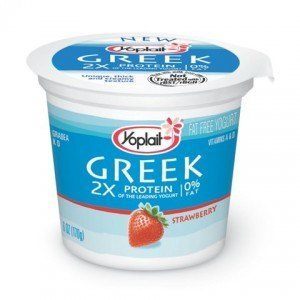Many people wonder about feeding their dogs Greek yogurt.
Sharing seems like a good idea based on the high protein and probiotic properties. Is that line of thinking correct?
Here’s the deal:
 This type of yogurt isn’t dangerous, but it is still a dairy product. While the Greek variety has reduced lactose, your dog’s stomach may not fully agree.
This type of yogurt isn’t dangerous, but it is still a dairy product. While the Greek variety has reduced lactose, your dog’s stomach may not fully agree.
That said, a small amount is usually uneventful. The key is to stick to modest portions.
In Moderation, Your Dog Can Eat Greek Yogurt
Be conservative.
Go easy when providing this yogurt to your precious pet, especially the first time sharing.
Dairy Doubtful For Dogs
Greek yogurt, even with its protein, obviously is not a natural fit for your dog’s diet.
And that’s why you’ve got to play it safe with dairy products.
Limiting Greek yogurt to a special treat is a reasonable approach, even if your dog seems to handle it well.
The thing is, despite reduced lactose, your dog could be somewhat intolerant and you may not even know it.
But generally Greek yogurt doesn’t have to be off limits.
Greek vs Regular Yogurt
It can be argued that Greek yogurt is more appropriate, and a bit healthier, for dogs compared to regular yogurt.
The extra straining means less lactose (whey), sodium, sugar and carbohydrates yet there’s more protein!
On the flip side, Greek yoghurt also has less potassium and calcium.
Overall though, at least compared to plain old yogurt, this particular variety does make more sense for dogs.
Probiotic Benefits For Pets?
Greek yogurt can, at least in theory, also improve your dog’s digestion.
Lactobacillus acidophilus is a live bacteria strand that is good for gut health. But this microorganism, and others like it, isn’t only in Greek.
All probiotic-packed yogurts can strengthen the immune system.
These benefits apply to dogs too. Consistency, however, is important for these effects to be realized.
The Answer Is Debatable
By now you are probably sensing that we aren’t exactly raving about Greek yogurt for dogs.
Again it’s a dairy product. And it also doesn’t make sense from a cost standpoint.
Want to hear an alternative and hard-hitting viewpoint?
Watch this video!
Just as a Light K9 Treat
Greek yogurt is low in calories which is certainly a plus! Your dog won’t get sluggish.
Perhaps it can be a light snack once in awhile if your buddy can handle the moderate lactose levels.
If so, it’s a health food!
Though Greek yogurt is extra creamy, the carb count comes in low – just like the lactose levels.
It cannot be stressed enough:
Limit your dog’s portions. And the same goes for cottage cheese as well as fermented kefir.
FYI: Cheese, itself, is also quite low in lactose.
The Bottom Line
Greek yogurt, if it agrees with your dog’s stomach, is okay if you stick to feeding it in moderation.
Just like with humans, there is a probiotic potential for pets.
It is also packed with protein and fares well against regular yogurt.
On the other hand, greek yogurt does contain dairy. For your dog’s sake, don’t get carried away.

I’d like to know how much plain fat-free Greek yogurt to give my 6 pound Chihuahua. Should I give him a teaspoonful or less or a little more?
My Lexi is having digestive issues and diarrhea. She just got done with her antibiotics. Someone told me that yogurt was good for that problem. Yesterday I gave her a small container of Greek vanilla yogurt.
Unfortunately I noticed a bowel movement was a little soft. Now I read this about yogurt and I am very upset with myself. I just hope I didn’t do any harm to her.
Artificial sweetener can be deadly for dogs. I am shocked that wasn’t mentioned in this article! Make your own kefir at home. Give your dog some kefir in plain-cooked stone-ground oatmeal each day for breakfast. It does wonders!
Lactose intolerance is usually not a problem in humans or dogs when eating yogurt. Yogurt is very low in lactose and most lactose intolerant people tolerate it very well. Commercial foods are much more highly processed than yogurt. Alternately, yogurt lovers can make their own and it’s very simple. Then you know exactly what both you and your pup are eating.
How about a tablespoon of plain Greek yogurt, with a fresh blueberry or 2 and a raspberry, for a dog treat for the 4th of July? This has the red, white and blue colors of the American flag and is better than ice cream isn’t it?
They are not meant to have sugar. You could be doing more harm than good, especially if they have a yeast infection or leaky gut. Berries are okay in moderation. If you really must give yogurt, and your dog has no health issues, then go for it. Just don’t give too much, as it can cause diarrhea.
The problem with dairy is the casein for both humans and animals due to it’s allergic potential. It is also made into glue. Search “casein glue” to read info. Lactose is mostly used up by the bacteria which feed on it. Essentially bovine milk is for baby calves. We don’t give pets human milk because it’s formulated differently for each species for many reasons.
If I want ice cream, I prefer coconut as I am not a baby calf. Human milk ice cream or yogurt would be silly, yes? There is a difference between belief and facts. Mostly humans follow the herd and deal with the health consequences later. We cannot say that humans who consume bovine or goat dairy have no health issues related to this. First rule for allergies is to eliminate dairy from a diet, next are grains, etc.
If the animal requires probiotics, they may need digestive enzymes instead. They can be purchased as a supplement, same as humans, in powder form without consuming yogurt. The best is labeled organic as it is not made from GMO corn sources.
Yoghurt is incredibly beneficial to dogs in a number of ways. Yes, some do have a lactose intolerance but those are few and far between. In those instances, goat yogurt might be more suitable.
It helps with flatulence, internal digestion, keeps everything in balance, is an alternative protein source and much more. You can feed ordinary fat free yogurt or Greek.
But, if you can afford it, goat yogurt is best as it is naturally probiotic. The proteins are easier to break down and have more benefits than yogurt made from cows milk.
I feed my dog Orijen (the very best dry food available). But I also give her a tablespoon of goat yogurt and extra virgin olive oil every day. She thrives. Glossy, healthy, fit, happy.
I have a 12 year old, female St. Bernard mutt, who has clearly had some yeast issues. A spoonful daily of a quality (Fage) Greek yogurt (low fat version) has had very positive effects, extremely evident. Less smelly, better coat, better poops, etc.
I don’t imagine it’s of much value at age 5, but can definitely be useful when they’re old, immobile, and have questionable immune systems. As her physiology is not completely unique, I’m inclined to think it applies more broadly.
I don’t think they need much. A big dog (like my girl, ~120 pounds) is probably good with a level tablespoon once a day. I’m convinced that good yogurt can be of considerable advantage to some dogs, especially older dogs.
Obviously, food matters more. Don’t load them up with extra fat and sugar in the process. A little bit of plain, quality yogurt is very palatable to dogs.
I have a Pit bull/Lab mix. When I got her she had dry, flaky skin and a thin coat. I have had her for over two years now. She was able to grow a thick beautiful coat within weeks. She was probably allergic to her food at the shelter and very stressed out.
Any time she starts to get stressed, I give her a 1/2 cup of Greek yogurt after her dinner a few nights a week. It seems to clear it up pretty quickly with less itching, licking, etc.
She hasn’t had any digestive issues with the yogurt, but she does have an iron stomach. I’m a pharmacist, so I know that there are also over-the-counter L. Acidophilus supplements, but they are very concentrated so I would check with your vet first.
As a chemist, you would know that kefir is a good choice for probiotics, especially goats’ milk Kefir or even goats’ milk alone. Unlike cows milk, goats’ milk works as a probiotic.
My Pit bull had a skin problem which was causing him lots of itching and discomfort. A friend mentioned that his skin smelled sort of yeasty, even though he is bathed regularly.
We started giving him yogurt with is dry dog food, and it cleared up his skin condition within a week or so. We had previously eliminated any dog food that had chicken bi-product in it, but that only helped so much. The combination made a huge difference.
Same with our dog! We have been dealing with him itching and biting at himself for a couple of years and the vet hasn’t really helped. I found out about the yeast thing by searching online, saw that yogurt might help and have been giving him a spoonful a day. It’s like day and night. He doesn’t itch nearly as much and our groomer commented on how much better his skin is!